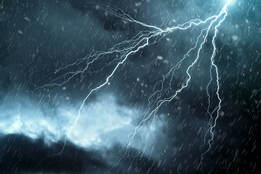
“There are only two feelings. Love and fear.
There are only two languages. Love and fear
There are only two activities. Love and fear.
There are only two motives, two procedures, two frameworks, two results.
Love and fear. Love and fear”...
“Storms of various kinds have long been part of the natural order around the world. Human beings have learned to live with these storms as an integral part of the weather patterns of the planet. In the storm one can discern the way of the wind, the lightning and the rain for those who live on the sea shore or in the rain forest. With the advent of global warming, the weather patterns are changing. This warming has not only caused the arctic circles to start melting and the water levels of the ocean to rise, thereby threatening many residences along the coast. The warming process has also increased the temperature of key channels and currents in the oceans of the world, currents that affect the weather pattern. The number and kind of storms across the globe are beginning to increase and threaten many habitats. Storms are on the increase.”
We have certainly seen these things in recent days with the terrifying devastation in the Bahamas wrought by hurricane Dorian. This has killed at least 51, with well over a thousand still missing and in excess of $70billion dollars of damage. Such extraordinary weather events are on the rise and cannot be ignored. Young people are rightly anxious for their future and that of their children – hence Friday’s Climate Strike, which has been proclaimed as the largest climate protest ever, involving 185 countries, with over 30,000 taking part here in Brisbane alone in a procession that stretched over two kilometres.
This is not a storm in a teacup. Greta Thunberg and our young people are alerting us to something vital for us all. The climate crisis is the storm of our day – there is no more urgent issue demanding attention, and especially the attention of the disciples of Jesus. It provokes fear and demands love. Like the first disciples we are not to panic – we are not to assume that God is simply asleep on a cushion while the world burns – but we are to take loving action. This is why eg. at the local level Jeni’s contribution to the Eco Expo last week is so important, along with all that we try to do in this parish to raise awareness of the need to care better for our planet. But we must act out of love and not out of fear.
The same applies to the current ‘storm’ in our Anglican church over LGBTIAQ+ people and same gender marriage. Out of love for all those whom God has made in God’s image, we must stand up with this community and seek to include and not exclude. It was wonderful to see clergy (including a bishop) and laity from many Anglican, Uniting and other churches walking in the Brisbane Pride march yesterday, alongside members of the MCC. We have to stand up and be seen, and not fear the thunder and lightning that comes from certain quarters.
But how to weather the storms? What can we learn from the way in which Jesus calmed the storm? For this was not so much a miracle of power, as one of love. He was able to be inside the storm – asleep, secure in its still eye – to identify with it. The disciples were full of fear – ‘Teacher do you not care that we are perishing?’ But Jesus from a place of peace and deep love, speaks to the storm, recognising it as part of himself and not separate. And calm is restored. It is a work of love.
To love in that kind of way requires a great deal of contemplative discipline. The kind of discipline that does not focus on the little demands of the ego, the passing concerns of our small lives. Rather it asks that into the storms of our world and our own lives we speak the words of Jesus, ‘Peace, be still” – one translation of the Greek suggests, ‘Hush there’ – like singing a lullaby to the storm. To do this is not just a profound act of trust, it is also the way in which we can diminish the hold of the storm over us.
It may be that the storms of our world, church and your own lives sometimes keep you awake at night. Fear is powerful. But love is more powerful. So, no matter what storm is making you afraid, remember that it is a part of you and to be met with love. Sing to it that lullaby of Jesus, ‘hush there’. And when you take that posture of trust, even in the face of evil and seeming chaos, be sure that the love of Christ will sustain you. There are only two ways, fear and love. Choose love.
Some words of Haruki Murakami in closing, “And when the storm is over, you won’t remember how you made it through, how you managed to survive. You won’t even be sure, whether the storm is really over. But one thing is certain. When you come out of the storm, you won’t be the same person who walked in. That’s what this storm’s all about”
In the name of our transforming God, who walks with us in our places of fear and teaches us to love. Amen.
by Penny Jones, for Storm Sunday in the Season of Creation, 22 September 2019
 RSS Feed
RSS Feed